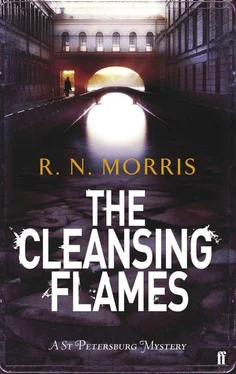R. Morris - The Cleansing Flames
Здесь есть возможность читать онлайн «R. Morris - The Cleansing Flames» весь текст электронной книги совершенно бесплатно (целиком полную версию без сокращений). В некоторых случаях можно слушать аудио, скачать через торрент в формате fb2 и присутствует краткое содержание. Год выпуска: 2011, ISBN: 2011, Издательство: Faber and Faber Fiction, Жанр: Исторический детектив, на английском языке. Описание произведения, (предисловие) а так же отзывы посетителей доступны на портале библиотеки ЛибКат.
- Название:The Cleansing Flames
- Автор:
- Издательство:Faber and Faber Fiction
- Жанр:
- Год:2011
- ISBN:0571259154
- Рейтинг книги:5 / 5. Голосов: 1
-
Избранное:Добавить в избранное
- Отзывы:
-
Ваша оценка:
- 100
- 1
- 2
- 3
- 4
- 5
The Cleansing Flames: краткое содержание, описание и аннотация
Предлагаем к чтению аннотацию, описание, краткое содержание или предисловие (зависит от того, что написал сам автор книги «The Cleansing Flames»). Если вы не нашли необходимую информацию о книге — напишите в комментариях, мы постараемся отыскать её.
The Cleansing Flames — читать онлайн бесплатно полную книгу (весь текст) целиком
Ниже представлен текст книги, разбитый по страницам. Система сохранения места последней прочитанной страницы, позволяет с удобством читать онлайн бесплатно книгу «The Cleansing Flames», без необходимости каждый раз заново искать на чём Вы остановились. Поставьте закладку, и сможете в любой момент перейти на страницу, на которой закончили чтение.
Интервал:
Закладка:
R. N. Morris
The Cleansing Flames
‘Some were especially intrigued by the possibility that a fateful secret lay hidden in his soul; others positively liked the fact that he was a murderer.’
The Devils, Fyodor DostoevskySt Petersburg
April 1872
An idea made manifest
The arsonists had chosen their target well. The warehouse was wooden and it contained barrels of vodka, produced at the nearby distillery on the small island in the Malaya Neva.
Pavel Pavlovich Virginsky stood on Alexandrovsky Prospect, looking up at the burning building. Brilliant orange tongues licked out from the windows, questing the black night. Virginsky could sense the fire gorging itself on this plentiful fuel. More than that, he could hear its savage, drunken roar, as it grew in force and intensity. A series of booming explosions, like gigantic belches, resonated within. So far the structure was holding out, but its collapse was surely imminent. The smoke was thick with the stench of burning resin from the timbers as they started to catch. Weightless seeds of fire swirled in the hot eddies above and around the building, an aura of destruction. It was in the fire’s nature to spread itself, consuming and converting everything in its path. These sparks were the emissaries of that intent. The surrounding apartment buildings, exposed in a tremulous glow, seemed to shiver as they awaited its approach.
The choice of location had a symbolic resonance, as the avenue had only recently been named in honour of the Tsar.
They had chosen their day carefully too. Easter Sunday night. Even Virginsky had been shocked by this. He considered himself an exemplary freethinker and indeed was not afraid to call himself an atheist, at least not in the privacy of his own conscience. But even he, that day, had paid a seasonal visit on his departmental head, Prokuror Liputin, to declare Christ risen and exchange kisses with his colleagues.
Virginsky thought now of the extended embrace in which Porfiry Petrovich had held him, as if peculiarly unwilling to let him go. After the kiss, the older man had looked searchingly into his eyes. His look held a challenge, and seemed to sense Virginsky’s unease. Certainly, Virginsky had attended largely as a matter of form, for reasons of professional prudence. It would not do for a magistrate to absent himself from the Departmental Head’s home on Easter Sunday. It would certainly be noted, and a black mark placed against his name. The question asked by Porfiry’s glance seemed to be: Can you really not believe? Perhaps for that day, he did. He at least saw the wisdom of pretending to. The unease that Porfiry’s gaze identified was the spiritual imbalance caused by hypocrisy.
Perhaps that was why he had rushed out to see the fires. He was in awe of those who had started them. By adding blasphemy to the crime of arson, they proved that they were not afraid of the old superstitions; by bearing witness, Virginsky could perhaps expiate some of his earlier pusillanimity.
One thing was for sure, Virginsky was not there in his capacity as a magistrate. He was not wearing his civil-service uniform and was dressed instead in an old overcoat from his student days that he hoped would not draw undue attention. Had he been observed by anyone from the department, or by a spy working for other departments, he would have been able to argue that it was within his remit to familiarise himself with the nature of the criminal damage being perpetrated. Should any fatalities result, he and his superior — Porfiry Petrovich — may well have been called upon to lead an investigation. He was simply acquainting himself with the scene of a crime on his own initiative.
Except, as Virginsky knew, there was a little more to it than that.
The fire drew him elementally.
The splendour of it gripped his heart. This was an idea, a terrible, wonderful, ineluctable idea, made manifest. A radical fervour lived in the restless twists of the flames, in their eager stabs and sallies. It was an idea that towered over him, that threatened to destroy him, even though it was — at that moment — an idea he believed in, an idea he hungered for.
He welcomed its heat on his face, almost as if he was welcoming the prospect of his own annihilation. If he must become nothing for the sake of the all-conquering fire, then so be it.
Virginsky was not alone. A crowd of mostly students — the fire was not far from the university district — together with some lowly looking clerks, and even a number of junior army officers, was gathered there. Like the fire, the mood was constantly fluctuating. At times, a wild elation spread through them. Their shouts rode on the crack and hiss of the flames. Then, suddenly, it was as if they were cowed by what they were witnessing. They knew that something had been unleashed. Perhaps among them were the individuals who had unleashed it. Just as suddenly, the memory of the grievances they held, on their own and others’ behalf, shook them out of this muted depression. They spat and fumed. Anti-tsarist slogans jostled with calls for universal destruction.
Virginsky felt his heart enlarged by the transgressive spirit of those around him, though he was careful not to join in the shouting.
But more than anything, the dramatic tension of the building’s fate held them. This was more than spectacle, it was theatre. They could hear the clanging bells of the approaching fire carts, close now, very close. But still, would the engines arrive in time to save the warehouse? Surely not. At any moment the fire would take hold of the building’s shell in earnest. Conflagration and collapse were only moments away.
The first of the fire carts thundered into the avenue, pulled by a team of two horses. It seemed to be heading straight for the crowd, which scattered at its approach. The men of the St Petersburg City Fire Company were standing on running boards either side of the steam pump engine. They rode the jounces of speed skilfully, ducking and rising on their knees, their Achilles helmets bobbing like puppets’ oversized heads. But as the cart banked to pull up, the firemen swayed precariously. One man fell from the cart. He toppled like a surprised acrobat. His helmet somehow came off in the fall. The speed of it all made it difficult to be certain but he must have hit the ground with his head, because Virginsky saw immediately that he was not going to get up.
The cheers of some of the students shocked him. But when the second fire cart came on the scene, and the fallen fireman was trampled under the horses’ hooves, they were silenced. They turned away from his mangled body as if from a distasteful outburst.
And then, at almost the same moment, there was another sequence of explosions from the warehouse and the roof was suddenly no longer there. Huge orange waves burst out, a sea of fire lashing the night sky. The fallen fireman was forgotten.
The crews were too late. In almost the same instant, the walls of the warehouse fell in with a low, grumbling crash. The building was no more. There was only fire.
The horses, though blinkered, were naturally uneasy; they whinnied as they strained their heads away from the heat, shifting their hooves in agitation. The men, though, were too intent on the task in hand to pay any heed to the animals. As they jumped down from the carts, they seemed pathetically tiny in comparison to the vaunting flames. They set to with a grim energy, trailing draw-hoses into the river. (Fortunately, the warehouse was situated within pumping distance of the Malaya Neva, at the point where the Alexandrovsky Prospect joined the recently constructed embankment at the southern tip of the Petersburg Quarter.)
The steam engines began pumping, pistons heaving and sliding with mesmerising monotony. Two white jets shot high into the air, breaking up and vaporising before they reached their target, puny and ineffectual for all the red gleam and glissando power of the fire engine. The crackle of the fire was like laughter on a vast, inhuman scale.
Читать дальшеИнтервал:
Закладка:
Похожие книги на «The Cleansing Flames»
Представляем Вашему вниманию похожие книги на «The Cleansing Flames» списком для выбора. Мы отобрали схожую по названию и смыслу литературу в надежде предоставить читателям больше вариантов отыскать новые, интересные, ещё непрочитанные произведения.
Обсуждение, отзывы о книге «The Cleansing Flames» и просто собственные мнения читателей. Оставьте ваши комментарии, напишите, что Вы думаете о произведении, его смысле или главных героях. Укажите что конкретно понравилось, а что нет, и почему Вы так считаете.












